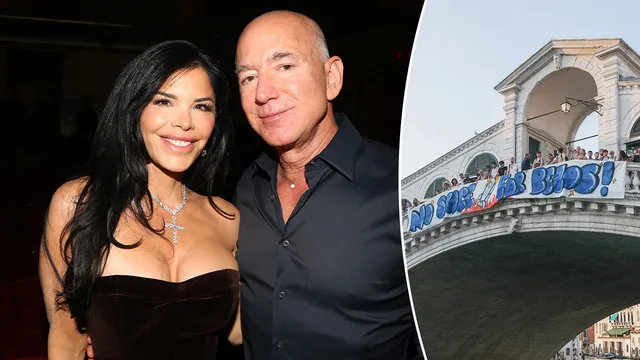
Venetians protest against Bezos' wedding over tourism concerns
2025-06-19 17:52- Residents of Venice are protesting against Jeff Bezos and Lauren Sánchez's wedding due to fears of worsening tourism issues.
- Protests emphasize existing problems like high housing costs and cultural erosion caused by mass tourism.
- The city's mayor claims that the event will respect Venice's unique character and is economically beneficial.
Express your sentiment!
Insights
In Venice, Italy, locals are voicing their concerns over the upcoming wedding of Jeff Bezos and Lauren Sánchez, scheduled to take place from June 24 to 26. Protests began as citizens fear that the wedding will exacerbate the city's existing overtourism crisis, which has long been a source of contention among residents. Venice, a UNESCO World Heritage site with a population of about 50,000, is projected to host around 20 million visitors yearly, leading to significant issues like high housing costs and erosion of local culture. Organizers of the protests, such as Federica Toninello, are calling for disruption of the wedding events, highlighting that the city's charm is being overshadowed by wealthy visitors. Some residents have expressed differing views, noting the revenue that such high-profile events could bring. However, the overarching sentiment among protesters is that the wedding signifies a commodification of their city. Local officials, including Mayor Luigi Brugnaro, assert that Venice is well-suited to host significant events with minimal disruption to daily life. They claim that the wedding will be respectful of the city’s unique character and that local vendors are being utilized for the preparations. In response, the mayor maintains that the protests do not represent the views of the majority of Venetians who are proud of their city being chosen for such a high-profile celebration. Despite the city's positive outlook on the economic benefits, many locals are skeptical. They believe that these events cater primarily to the wealthy and do little to address ongoing challenges like high rents and inadequate public services. As the wedding date approaches, the tension between the allure of celebrity events and the concerns of local residents continues to grow, highlighting the ongoing struggles within the tourism sector in Venice.
Contexts
The impact of mass tourism on Venice has become a critical issue that necessitates a careful examination of its economic, social, and environmental dimensions. Venice, a unique city built on a lagoon, attracts millions of visitors from around the globe each year. This influx of tourists has contributed significantly to the local economy, providing employment opportunities and generating revenue for local businesses. However, the benefits of tourism come at a considerable cost, as the very fabric of Venice's culture and heritage is increasingly threatened by the overwhelming number of visitors. The city's infrastructure, which was never designed to accommodate such large crowds, is under severe strain, leading to congestion and degradation of public spaces. Residents have reported a decline in their quality of life, resulting from the daily challenges posed by large groups of tourists navigating the city. The environmental consequences of mass tourism are particularly concerning, as the delicate lagoon ecosystem suffers from pollution and heightened vulnerability to climate change. The increase in cruise ships, which are often criticized for their environmental footprint, exacerbates the situation by introducing hazardous waste and contributing to the erosion of the city's foundations. Moreover, the rising sea levels, coupled with the significant infrastructure required to sustain the tourist influx, pose a dire threat to Venice's long-term viability. The local government has begun to implement measures to regulate the number of visitors and promote more sustainable tourism practices. Efforts such as limiting access to certain areas of the city and promoting alternative tourist experiences in lesser-known locales aim to distribute the flow of visitors more evenly throughout the year and across different regions. Additionally, there is growing advocacy for responsible tourism, encouraging visitors to engage with the city's cultural heritage in a respectful manner while supporting local artisans and businesses. However, striking a balance between preserving Venice's unique identity and catering to the demands of the global tourism industry remains a formidable challenge. In conclusion, the impact of mass tourism on Venice highlights the complexities of managing a city that serves as a cultural treasure and a global tourist destination. While the economic benefits of tourism are undeniable, the social and environmental consequences cannot be overlooked. A comprehensive approach that involves local stakeholders, tourists, and policymakers is essential in creating a sustainable model for tourism in Venice that honors its rich heritage while ensuring that it remains a livable city for its residents. As the world faces unprecedented challenges related to climate change and human activity, the lessons learned from Venice's experience may offer crucial insights for other cities grappling with the pressures of mass tourism.